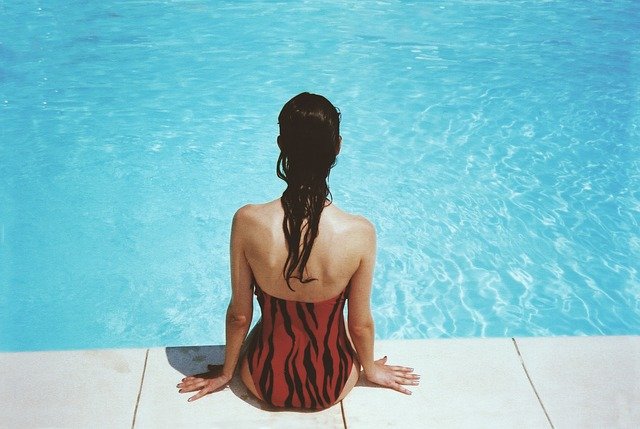
There may be nothing quite as refreshing as taking a dip in the pool on a hot summer day.
You emerge feeling cooled and restored, but then you go shower and get ready to face the rest of your day, and suddenly you’re not so happy.
What happened to your skin and hair?
Chlorine is a chemical used to help kill bacteria and other potentially dangerous microorganisms in pools. It does a good job of keeping us safe from these little bugs, but at the same time, it tends to negatively affect skin and hair. Here’s how it damages both, and what you can do to enjoy your swim without having to pay for it later!
How Chlorine in Swimming Pools Damages Hair and Skin
Chlorine can wreak havoc on your appearance in a number of ways.
- Damaging free radicals: Chlorine is an “oxidizing” agent, which means it can encourage the formation of free radicals—those unstable molecules that damage proteins, lipids, cells, and tissues. Like pollution and UV rays, chlorine can, with repeated exposure, lead to the appearance of fine lines and wrinkles.
- Strips away oils: Chlorine is also a cleansing agent, and a harsh one at that, so it strips your skin and hair of the natural oils that help keep them moisturized and hydrated. The result is dryer skin and damaged hair cuticles.
- Metal contamination: Chlorine in some pools interacts with copper pipes and other metals to cause small amounts of those metals to enter the water. These metals can affect the hair, changing its tint.
Unfortunately, after a few weeks of regular swimming, you may notice the following adverse effects:
- Dry, brittle hair that’s more prone to breakage
- Lackluster hair that has lost its shine
- Frizzy hair
- Dry, irritated skin and scalp
- Weak, brittle nails that break more easily
- Discolored or “greenish” hair (particularly if you have blond or light hair)
- Itchy, rashy, reactive skin
- More visible fine lines and wrinkles
- Skin dullness
How to Keep Skin and Hair Looking Great Even If You Love to Swim
Fortunately, you don’t have to choose between healthy skin and hair and your love of the pool. Simply take the following steps to make sure that chlorine and other chemicals in the water don’t harm you.
- Apply hair product before going in: Your hair needs something to protect it, so try putting on a silicone-based hair serum, or a natural carrier oil like coconut or jojoba oil. These oils will break down eventually while you’re swimming, but they will coat the hair strands and help protect them from damage.
- Wear a swim cap: This may be the best way to protect your hair.
- Get your hair wet: Wetting your hair before swimming helps slow down how quickly it absorbs the chlorine. If you don’t want to wear a cap, pin your hair back to help reduce exposure.
- Clarify hair after swimming: Regular shampoo may not get the chlorine out after swimming. Try a hair-clarifying shampoo, or use some apple-cider vinegar mixed in water to do a final clarifying rinse.
- Apply a moisturizing mask: If you’re a frequent swimmer, you may want to apply a moisturizing mask to your hair at least once a week. This can help restore moisture and keep the hair follicles healthy. The ones that you leave-in overnight can be very effective.
- Apply sunscreen before jumping in: Many types are water-resistant and are formulated for swimming, so find one of these and apply at least 15 minutes before swimming. You still need to protect your skin from the sun!
- Shower after swimming and apply lotion: It’s super important to shower off all those chemicals after swimming. Bonus if you use a scrubbie to help exfoliate at the same time. Then immediately apply a nourishing, hydrating lotion to help your skin recover. We recommend our Calming Moisture and Body Repair Lotion, as they both help tame inflammation while providing lasting moisture.
- Don’t forget your cuticles: When applying lotion, make sure to massage some into your cuticles. This will help your nails recover.
How do you protect skin and hair from the chlorine in pools?

